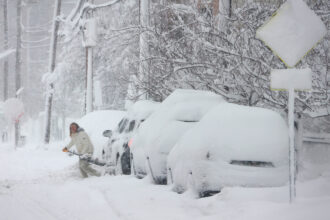“Reaching 100 percent renewable energy as quickly as possible is required to save our planet from the worst effects of climate change.”
—Tulsi Gabbard, February 2019
Been There
Rep. Tulsi Gabbard’s home state of Hawaii is a constant reminder to her of the risks that come with climate change. Months after her election to Congress in 2012, she opposed a budget sequestration plan that would have resulted in the furlough of 2,600 employees at the National Oceanic and Atmospheric Administration, saying the move would make it harder to fight climate change. In 2017, she denounced President Trump’s decision to withdraw from the Paris climate accord, saying climate change “threatens the safety and security of the planet, especially in places like Hawaii where we are already experiencing its devastating effects.”
Done That
Gabbard, an Iraq war veteran, introduced the Off Fossil Fuels for a Better Future Act, or OFF Act, in Congress in 2017 to promote a “just transition” from fossil fuels to cleaner energy sources. In the legislation, she described the disproportionate impact of fossil fuels production on communities of color and proposed requiring 100 percent of electricity sold in the U.S. to come from clean energy sources by 2035. She also proposed requiring manufacturers to sell only zero-emissions vehicles, the electrification of train rail lines and engines, ending fossil fuel subsidies, and extending tax credits for wind and solar production and investment.

The ideas Gabbard set out in the OFF Act included a charge to modernize electricity grids to help states set renewable energy standards, like the 100 percent renewable energy goal set in 2015 in Hawaii. Gabbard advocates for “significant investments” in renewable energy technology like energy storage and for loan guarantees for utility-scale renewable energy projects. She has sided with climate activists on most issues and has a 94 percent scorecard from the League of Conservation Voters.

Getting Specific
- Gabbard expressed early support for the Green New Deal, but when the resolution was released, she opted not to be a co-sponsor, citing concerns over the “vagueness of the language.” On her website, Gabbard said she supports the Green New Deal’s zero-emissions goals, but “I do not support ‘leaving the door open’ to nuclear power unless and until there is a permanent solution to the problem of nuclear waste.”
- Gabbard supports a ban on fracking and ending fossil fuel and nuclear energy subsidies. She has talked about the importance of investing in sustainable infrastructure and agriculture, calling agriculture “something that’s not often talked about when we’re dealing with climate change, but is one of the biggest contributors of carbon to our environment and to our atmosphere.”
- She believes the U.S. “should be leading by example, leveraging innovation through science and technology, investing in clean energy, creating renewable energy jobs that cannot be outsourced, growing the economy, enhancing U.S. energy independence, and lowering energy costs for families and businesses, while reducing carbon emissions. We must continue to persevere and do our part to support efforts in the private sector and at all levels of government to combat climate change and protect our environment.”
- In the OFF Act, she proposed redirecting fossil fuel tax credits toward renewable energy, but doesn’t outline a carbon pricing plan. Like many of her opponents, Gabbard has signed the No Fossil Fuel Funding pledge.
Our Take
Gabbard has a track record of speaking out in support of clean energy and climate policies, including sponsoring legislation, but her decision to back away from her early endorsement of the Green New Deal felt poorly played for someone who has described climate action as being treated like “political football.” Her past comments on LGBTQ rights and “radical Islamic ideology” could also alienate her from some progressive voters.
Read Tulsi Gabbard’s climate webpage
Read more candidate profiles.
About This Story
Perhaps you noticed: This story, like all the news we publish, is free to read. That’s because Inside Climate News is a 501c3 nonprofit organization. We do not charge a subscription fee, lock our news behind a paywall, or clutter our website with ads. We make our news on climate and the environment freely available to you and anyone who wants it.
That’s not all. We also share our news for free with scores of other media organizations around the country. Many of them can’t afford to do environmental journalism of their own. We’ve built bureaus from coast to coast to report local stories, collaborate with local newsrooms and co-publish articles so that this vital work is shared as widely as possible.
Two of us launched ICN in 2007. Six years later we earned a Pulitzer Prize for National Reporting, and now we run the oldest and largest dedicated climate newsroom in the nation. We tell the story in all its complexity. We hold polluters accountable. We expose environmental injustice. We debunk misinformation. We scrutinize solutions and inspire action.
Donations from readers like you fund every aspect of what we do. If you don’t already, will you support our ongoing work, our reporting on the biggest crisis facing our planet, and help us reach even more readers in more places?
Please take a moment to make a tax-deductible donation. Every one of them makes a difference.
Thank you,











